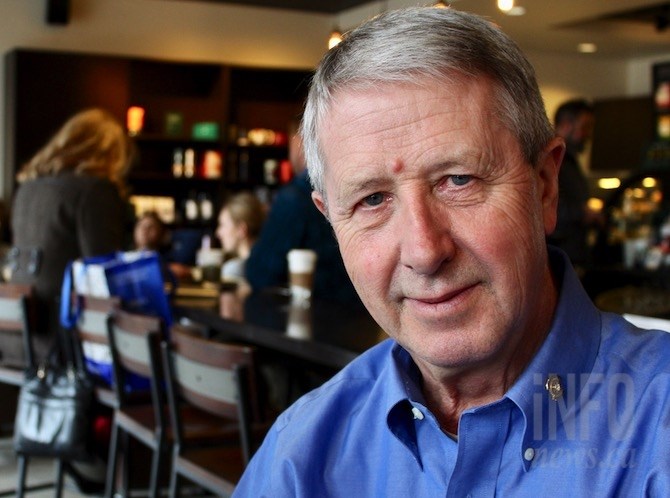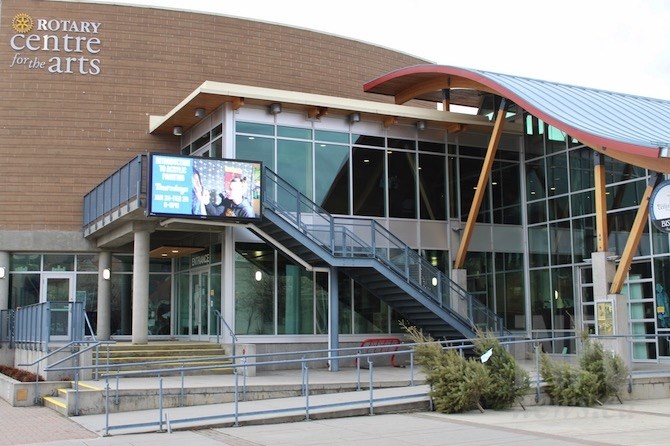
Kelowna's Peter Schultz will become District Goernor of Rotary District 5060 later this year.
(ROB MUNRO / iNFOnews.ca)
February 05, 2019 - 12:30 PM
KELOWNA - At a time when some service clubs are struggling to survive, Rotary is still going strong. But it’s not resting on its laurels.
“Rotary knows where it’s having trouble,” incoming distirct governor for Rotary District 5060 and Kelowna resident Peter Schultz told iNFOnews.ca. “As long as you know where you’re having trouble, you’ve got something to fix.”
Helping to fix what stopped working for Rotary since the turn of the century is something Shultz is determined to work hard to accomplish.
Rotary started in Chicago in 1905 when lawyer Paul Harris got a few business acquaintances together “so professionals with diverse backgrounds could exchange ideas, form meaningful, lifelong friendships, and give back to their communities,” states the Rotary International website. It was called Rotary because meetings rotated between the different offices of its members.
Rotary developed some strict rules to follow, including not allowing more than two members from the same profession into any one club and requiring members to attend 66 per cent of its weekly meetings – all of which feature guest speakers.
Those are two rules that have been softened or abandoned over the years as the club changes with the times.
In fact, the newest Rotary club Shultz has set up is called Rotary Now Kelowna and only uses the first five pages of Rotary’s guiding principles. Those deal with mission and vision statements and don’t impose membership or attendance rules or other traditional protocols like the weekly meetings.
By about 2000, Rotary grew to more than 1.2 members throughout the world. While membership has ebbed and flowed, it was on an upward climb until then. Since 2000, the membership base has stayed at about the same level – which has made the leadership realize that more needs to be done to attract members.
That means welcoming innovative ideas, such as Rotary Now, no matter where they come from.
Shultz will become District Governor of District 5060 in July. That district has about 2,700 members and 57 chartered clubs from Clearwater to Central Washington. It includes five in Kamloops, three in Vernon, 10 in the Central Okanagan and six in the South Okanagan.
There are also 20 Interact clubs based in high schools throughout the district and four Roteract clubs based in universities.
Shultz, who was once a physics professor, former owner of Doc Willoughby’s restaurant in Kelowna and former president of the Downtown Kelowna Association didn’t join Rotary until he was in his 40s – which was the typical age for joining the club.
“I noticed Rotarians doing various things about town,” he said. “My awareness (of Rotary) came from community but for me, it was the fellowship (that kept him there).”
Which is typical of why people join Rotary – not for the international service or networking, but to form friendships.
The Rotary name is on a few signs around Kelowna, such as Rotary Beach, which was originally on the Westside where members had to take a ferry to picnics, Rotary Marsh and the Rotary Centre for the Arts.
Their involvement in the arts centre was urged by then-Mayor Walter Gray who encouraged Rotary to raise about $650,000 to help fund the building.

Rotary Centre for the Arts in Kelowna was one of Rotary's biggest local projects.
(ROB MUNRO / iNFOnews.ca)
In the 1950s, Rotary clubs built – through their own hands-on labour and donations of materials – Pleasantvale seniors housing in the North End of downtown. While in the early years, Rotary subsidized the 70-unit complex, in later years they made money from it while charging far below market rents. It was recently turned over to B.C. Housing with the caveat that original residents would keep their low rents.
While Rotary International oversees the operation of clubs, the charitable work is funded through the Rotary Foundation.
Individual clubs need to raise money for their chosen projects but can get up to 6.5 times what they raise in grants from the foundation.
Each club has its own culture in terms of what kinds of projects it does and how much sweat equity members contribute.
Shultz’s club, Downtown Rotary in Kelowna, does a minimum of one international project each year, such as sending plastic surgeons and support staff to Ethiopia, but also funds smaller projects like building accessibility ramps at a senior’s home or helping out at the Food Bank. If it’s building a ramp, it's likely to be club members who scrounge up the materials through donations and do the actual construction work themselves.
Being a Rotarian requires a commitment of both of time and money. Joining is not cheap with a $300 annual membership fee. And weekly meetings generally come with a meal that members pay for themselves, along with being hit up for other donations.
For most it comes back to the fellowship aspect of the clubs, Schultz said, like a weekly meeting with like-minded people doing good deeds.
To contact a reporter for this story, email Rob Munro or call 250-808-0143 or email the editor. You can also submit photos, videos or news tips to the newsroom and be entered to win a monthly prize draw.
We welcome your comments and opinions on our stories but play nice. We won't censor or delete comments unless they contain off-topic statements or links, unnecessary vulgarity, false facts, spam or obviously fake profiles. If you have any concerns about what you see in comments, email the editor in the link above.
News from © iNFOnews, 2019